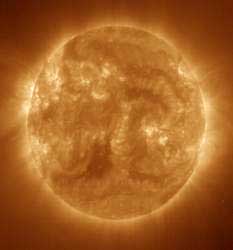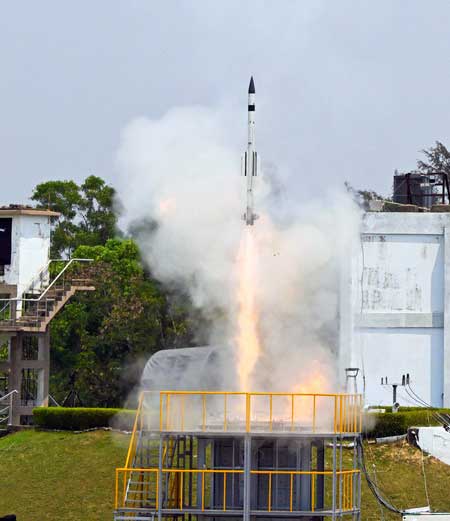Astronomers from the Indian Institute of Astrophysics (IIA), an autonomous institute of the Department of Science and Technology, have accurately estimated the physical parameters of thermal and magnetic field structures of solar coronal holes.
These structures have a significant influence on space weather that affects satellites, as well as the Indian summer monsoon rainfall.
“Coronal holes, which are dark regions in X-ray and extreme ultraviolet images of the Sun, have open magnetic field lines and are hence important for understanding the interplanetary medium and space weather. The latitude dependence of temperature and the magnetic field strengths of these coronal holes have now been characterised accurately,” said the team from the (IIA).
A recent physics-based study found that besides the influence of sunspots, parameterised study of the radiative effects of coronal holes can satisfactorily explain the variability of Indian Monsoon rainfall.
To probe further, astronomers from the IIA used eight years of full-disk calibrated images observed by the Solar and Heliospheric Observatory (SOHO) space probe.
The study, published in the journal Astronomy and Astrophysics, accurately estimated the physical parameters of thermal and magnetic field structures of coronal holes.
“The study also offers a comprehensive understanding of how these near-equatorial coronal holes evolve as they traverse the solar disk,” said Dr Manjunath Hegde of IIA, and lead author of the study.
In addition, the team “found that there is no latitudinal variation of the temperature structure of coronal holes and also that there is a latitudinal variation of the strength of magnetic field structure of coronal holes that increases from the solar equator to the pole”.
“The first result suggests that coronal holes are likely to originate from the deep interior, whereas the second result suggests that coronal holes might have formed from the superposition of Alfven wave perturbations”, said Dr. K.M. Hiremath from the same institute.
"Coronal holes" in the sun's atmosphere were discovered in the 1970s by X-ray satellites. These appear dark in the X-ray and EUV wavelengths and are low-density regions that have open magnetic field structures in the interplanetary space.
These solar activity phenomena are intense sources of fast (450-800 km/sec) solar wind -- streams of charged particles that escape from the sun, more easily into space. This high-speed solar wind can interact with the Earth's magnetic field, causing disturbances like geomagnetic storms.
Effects of sunspots on the Earth's atmosphere and climate are well recorded, said the team. Considering these imminent dangers of space weather effects and the long-term influence of the solar coronal holes on the Indian Monsoon rainfall it is important to study their thermal, and magnetic field structures and their origin, they noted.








NPCI to decide on person-to-merchant payments cap on UPI transactions: RBI
In order to further boost digital payments, the National Payments Corporation of India will be enabled to set the limit on person-to-merchants transactions via Unified Payments Interface (UPI), RBI Governor Sanjay Malhotra said on Wednesday.
New AI algorithm to predict risk of cardiovascular events, heart-related death
A team of researchers in South Korea has developed a novel artificial intelligence (AI)-based algorithm that uses electrocardiograph (ECG)2 data to predict the risk of cardiovascular events, and heart-related death.
India successfully flight-tests indigenously-developed vertically-launched Surface-to-Air Missile
In a boost to India's precision firepower, the Defence Research & Development Organisation (DRDO) and the Indian Navy conducted the successful flight-test of indigenously-developed Vertically-Launched Short-Range Surface-to-Air Missile (VLSRSAM) on Wednesday, an official statement said.
Unplanned welcome: Dolphins greet astronauts as they return home after extended space mission
Astronauts Sunita Williams and Butch Wilmore, along with NASA’s Nick Hague and Russian cosmonaut Aleksandr Gorbunov, have returned to Earth after a lengthy journey that turned a planned eight-day mission into a nine-month in space.
Stranded US astronauts return to Earth, after nine months in space
The SpaceX Dragon spacecraft carrying them and two other astronauts—Nick Hague and Russian cosmonaut Aleksandr Gorbunov—splashed down into the waters off the coast of Florida state just minutes before 6 p.m., as NASA had announced.
Google to acquire cloud security platform Wiz for $32 billion
Tech major Google on Tuesday announced to acquire Wiz, a leading cloud security platform headquartered in New York, for $32 billion in an all-cash transaction.
Ahead of Sunita William’s ‘homecoming’, PM Modi pens letter to India’s illustrious daughter
As the NASA astronauts Sunita Williams and Butch Wilmore begin their journey back home from space, after staying ‘stranded’ at the International Space Station (ISS) for about nine months, Prime Minister Narendra Modi has written a letter to one of India’s most illustrious daughters hoping for her safe return.
Sunita Williams set to return to Earth tomorrow
With the pair of US astronauts stranded for more than nine months on the International Space Station (ISS), the National Aeronautics and Space Administration (NASA) has confirmed that the duo will return to Earth on Tuesday evening.